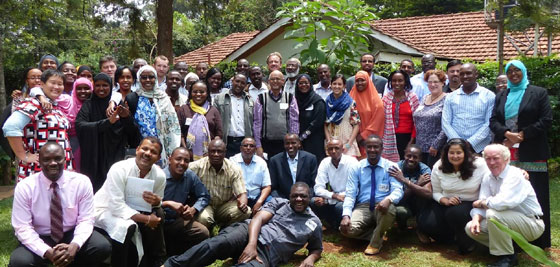The recent focus on local systems strengthening has created an opportunity to witness some encouraging results, especially when it comes to a variety of approaches for increasing local leadership of development activities. LINC has been working with local and international NGOs and donors on a number of new approaches. During our August 2014 trip to Kenya, we saw promising results from one such approach – the management of a local NGO’s own budget for self-improvement.
The trip offered LINC an opportunity to return to an African NGO client, Adeso, only six months after the previous visit and nine months from the start of our work together. The change that occurred within the organization over such a short time period was impressive and was primarily due to senior management buy-in based on the decision to dedicate a portion the organization’s own budget on continuous improvement.

“With the senior management team working together to ensure this investment results in concrete improvements, Adeso has achieved and will continue to achieve significant and sustainable change in a short time-frame.”
–Member of Adeso Senior Management Team
When LINC first began speaking with Adeso leadership in October 2013, they had recently experienced a period of tremendous growth, as their annual budget grew five-fold from 2004 to 2013. Management and staff recognized that, while their programs were successful and their methods as an African NGO supporting African communities was solid, they needed to update their structure and systems to meet the needs of a rapidly growing organization.
Based on Adeso’s self-assessment and comparative analysis of peer organizations, LINC and Adeso worked together to design a set of organizational development activities that met key needs and aspirations. These activities were budgeted from Adeso’s administrative funds, rather than from a donor or INGO partner – a commitment that has significantly improved results. From November 2013 through February 2014, LINC supported formation of an internal “Change Management Team,” (CMT) representing every country program and every department, with a mandate from senior management to conduct analysis and gauge the highest priorities of the organization.
During our February visit, we helped the CMT and senior management present the results of the analysis and the setting of prioritized strategic objectives for organizational improvement. From our in-country meetings and workshops, it was clear that staff across the organization were inspired to achieve the Adeso mission and vision, and that they were excited to adjust organizational structure and update systems to meet the challenges of a larger and rapidly growing NGO. Their voice was heard in the process and the changes reflected their requests. The main outputs of the trip were an up-to-date strategic plan, a change management plan, and a set of department operational plans to realize their goals over the course of the next three years.
Not surprisingly, the organization LINC returned to in August – just six months later – felt quite different. The organizational structure had been adjusted, beginning with the senior management team. Mid-level management and staff had already noticed that the new structure allowed for much more responsive decision-making and support. With the changes in structure, people were also beginning to move into positions that better fit their skills and ambitions. Departments were able to update and often simplify their systems and procedures with more input from their internal “customers.”
Adeso is rapidly evolving to a more sustainable entity that is comfortable with its size, allowing them to focus on other strategic topics such as advocacy, program quality, and resource development. The speed and effectiveness of these adjustments were clearly improved due to Adeso’s leadership and staff taking ownership managing their own organizational development.
